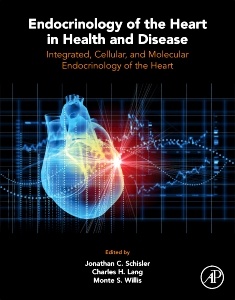Endocrinology of the Heart in Health and Disease Integrated, Cellular, and Molecular Endocrinology of the Heart
Coordonnateurs : Schisler Jonathan C., Lang Charles H, Willis Monte

Endocrinology of the Heart in Health and Disease: Integrated, Cellular, and Molecular Endocrinology of the Heart covers the traditional concepts of cardio-endocrinology, the role of the various hormone systems, both in health and disease, therapeutic implications, and other recent advances in the various fields represented.
The book explores how cardiac hormones are changed in various cardiac pathologies and the recent success that has been uncovered in their therapeutic use. Additional focus is placed on how the heart responds both physiologically and pathophysiologically to a plethora of circulating hormones, reinforcing the importance of the heart as a target of numerous endocrine systems, such as the brain, renal, and adipose. Significant advances have come from basic, clinical, and translational research from a multiplicity of investigators with diverse backgrounds.
The book features over 200 photomicrographs, diagrams of molecular relationships, and tables that complement and support the text. It is aimed at a wide audience, including graduate students and post-doctoral fellows in a wide array of biomedical departments and PhD programs (e.g. Pathology, Physiology, Genetics, Pharmacology, Molecular Biology, and Cell Biology) related to the endocrine and cardiovascular sciences curricula, as well as medical residents in pathology, laboratory medicine, internal medicine, and cardiology.
Part I: The Heart as an Endocrine Organ
Chapter 1. Cardiac Natriuretic Peptides
Chapter 2. Adrenomedullin
Chapter 3. Endothelin-1 as a Cardiac-Derived Autocrine, Paracrine and Intracrine Factor in Heart Health and Disease
Chapter 4. The Cardiokines: An Expanding Family of the Heart Secretome
Chapter 5. Novel Small Peptide Hormones
Part II: The Heart as an Endocrine Target
Chapter 6. Gut-Derived Hormones—Cardiac Effects of Ghrelin and Glucagon-Like Peptide-1
Chapter 7. Fat Hormones, Adipokines
Chapter 8. Neuronal Hormones and the Sympathetic/Parasympathetic Regulation of the Heart
Chapter 9. Renin Angiotensin Aldosterone System and Heart Function
Chapter 10. Nuclear Receptors and the Adaptive Response of the Heart
Chapter 11. Adrenergic Receptors
Chapter 12. Insulin Signaling in Cardiac Health and Disease
Charles H. Lang, PhD, is currently a Distinguished University Professor in the Department of Cellular and Molecular Physiology, and Professor of Surgery at the Penn State College of Medicine (Hershey, PA). He is also the Associate Dean for Graduate Studies. His research has focused on the mechanisms underlying changes in glucose and protein metabolism in skeletal and cardiac muscle, and the role of cytokines in the regulation of the insulin-like growth factor system in regulating muscle metabolism. He has worked extensively on the regulation of translational control of protein synthesis and the development of anabolic resistance during various catabolic states, including sepsis, thermal injury, disuse atrophy, alcoholism and HIV infection. Dr. Lang received his PhD from Hahnemann Medical College and did his NRSA-supported fellowship at LSU Medical Center in New Orleans. Before joining Penn State University, he was Director of Surgical Research at SUNY-Stony Brook. Dr. Lang has been continuously funded by the NIH for 30 years and is the current recipient of an NIH MERIT Award from NIAAA. He has been a permanent member of 2 NIH study sections: Surgery, Anesthesiology and Trauma, and Alcohol and Toxicology IV, and is currently the Chair of the AA-1 study section at NIH. Dr. Lang is currently the Editor-in-Chief of the American Journal of Physiology: Endocrinology an
- Develops the concept of the heart as both an endocrine organ and an endocrine target, exploring the endocrine function of the heart in both health and disease
- Explains how the levels of several cardiac hormones are changed in various cardiac pathologies and how some hormones can be used therapeutically
- Offers a single resource on cardio-endocrine disease which collates and curates the wide range of advances being made in the areas of molecular biology, biochemistry, physiology, and pathology
Date de parution : 11-2016
Ouvrage de 378 p.
19x23.3 cm
Thème d’Endocrinology of the Heart in Health and Disease :
Mots-clés :
A-FABP; Acute myocardial infarction; Adipokine; Adipokines; Adiponectin; Adrenal gland; Adrenergic receptors; Adrenomedullin; Adropin; Aldosterone; Alpha blockers; Angiotensin; Autonomic nervous system; Beta blockers; Biochemistry; Biomarkers; Blood pressure; Calcitonin gene-related peptide; Calcitonin receptor-like receptor; Cardiac; Cardiac function; Cardiac hypertrophy; Cardiofibroblast; Cardiokines; Cardiomyocytes; Cardiomyopathy; Cardiovascular; Catecholamines; Cellular signaling; Chemerin; Clinical trials; Contractile failure; Diabetes; Diabetes mellitus; ECM; ET-1; Endocrinology; Endothelin receptor antagonists; Endothelin receptors; Endothelium; Estrogen receptors; Estrogen-related receptors; Fatty acid; Fibrosis; Function; GLP-1; GRKs; Genes; Ghrelin; Glucocorticoid receptors; Gut; Heart; Heart failure; Hormones; Hyperglycemia; Hypertension; Hypertrophic effect; Hypertrophy; Inflammasome; Inflammation; Insulin; Insulin signaling; Interleukins; Irisin; Ischemia; Leptin; MMPs; Metabolism; MiRs; Mineralocorticoid receptors; Mitochondria; Myocardial infarction; Myokine; Natriuretic peptides; Nesfatin-1; Neuronal hormones; Neuronostatin; Nitroxidative stress; Novel peptides; Nuclear receptor; Obesity; Omentin; PEP7; PGC-1; PPAR; Parasympathetic; Physiology; Positive inotropic effect; Posttranslational modification; ROS; Receptor activity modifying protein; Renal function; Renin; Reperfusion; Resistin; Secretion; Signal transduction; Sympathetic; Sympathetic nervous system; Synthesis



